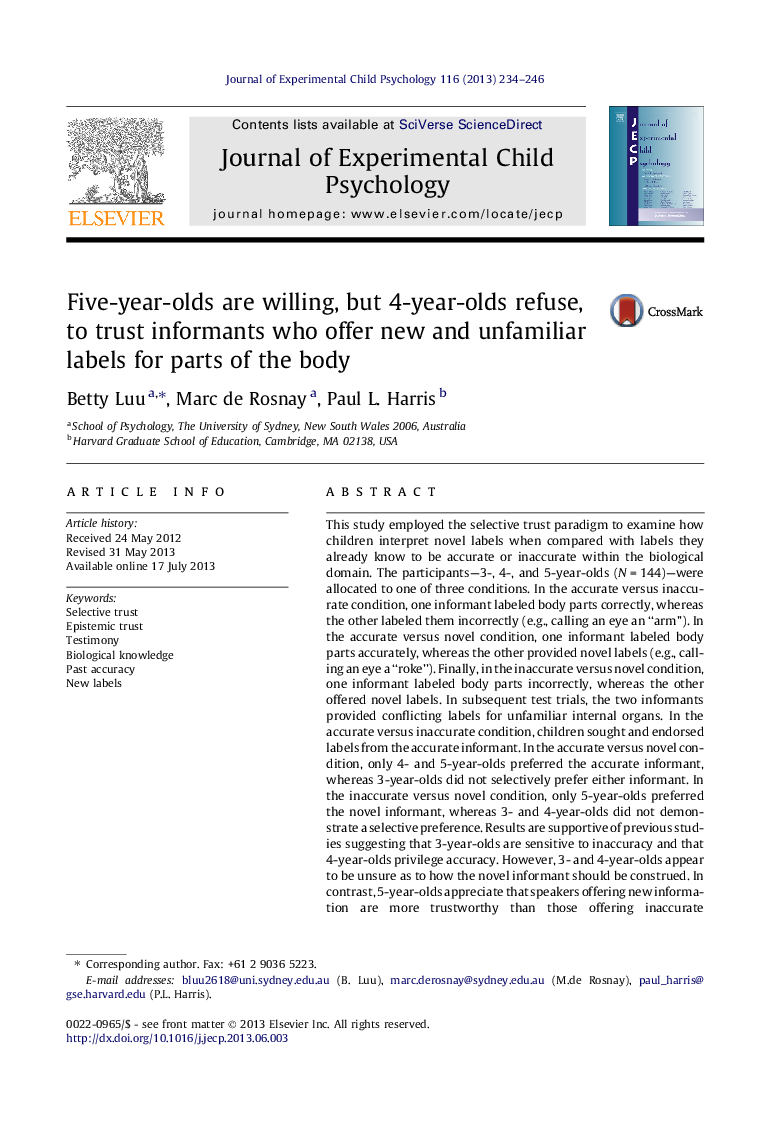| کد مقاله | کد نشریه | سال انتشار | مقاله انگلیسی | نسخه تمام متن |
|---|---|---|---|---|
| 10453081 | 919457 | 2013 | 13 صفحه PDF | دانلود رایگان |
عنوان انگلیسی مقاله ISI
Five-year-olds are willing, but 4-year-olds refuse, to trust informants who offer new and unfamiliar labels for parts of the body
ترجمه فارسی عنوان
پنج ساله مایل هستند، اما 4 ساله از اعتماد به خبرنگاران که علامت های جدید و ناآشنا برای قسمت های بدن را رد می کنند، حاضر نیستند.
دانلود مقاله + سفارش ترجمه
دانلود مقاله ISI انگلیسی
رایگان برای ایرانیان
کلمات کلیدی
اعتماد انتخابی، اعتماد معرفتی، شهادت، دانش زیست شناسی، دقت گذشته، برچسب های جدید،
موضوعات مرتبط
علوم انسانی و اجتماعی
روانشناسی
روانشناسی رشد و آموزشی
چکیده انگلیسی
This study employed the selective trust paradigm to examine how children interpret novel labels when compared with labels they already know to be accurate or inaccurate within the biological domain. The participants-3-, 4-, and 5-year-olds (NÂ =Â 144)-were allocated to one of three conditions. In the accurate versus inaccurate condition, one informant labeled body parts correctly, whereas the other labeled them incorrectly (e.g., calling an eye an “arm”). In the accurate versus novel condition, one informant labeled body parts accurately, whereas the other provided novel labels (e.g., calling an eye a “roke”). Finally, in the inaccurate versus novel condition, one informant labeled body parts incorrectly, whereas the other offered novel labels. In subsequent test trials, the two informants provided conflicting labels for unfamiliar internal organs. In the accurate versus inaccurate condition, children sought and endorsed labels from the accurate informant. In the accurate versus novel condition, only 4- and 5-year-olds preferred the accurate informant, whereas 3-year-olds did not selectively prefer either informant. In the inaccurate versus novel condition, only 5-year-olds preferred the novel informant, whereas 3- and 4-year-olds did not demonstrate a selective preference. Results are supportive of previous studies suggesting that 3-year-olds are sensitive to inaccuracy and that 4-year-olds privilege accuracy. However, 3- and 4-year-olds appear to be unsure as to how the novel informant should be construed. In contrast, 5-year-olds appreciate that speakers offering new information are more trustworthy than those offering inaccurate information, but they are cautious in judging such informants as being “better” at providing that information.
ناشر
Database: Elsevier - ScienceDirect (ساینس دایرکت)
Journal: Journal of Experimental Child Psychology - Volume 116, Issue 2, October 2013, Pages 234-246
Journal: Journal of Experimental Child Psychology - Volume 116, Issue 2, October 2013, Pages 234-246
نویسندگان
Betty Luu, Marc de Rosnay, Paul L. Harris,
